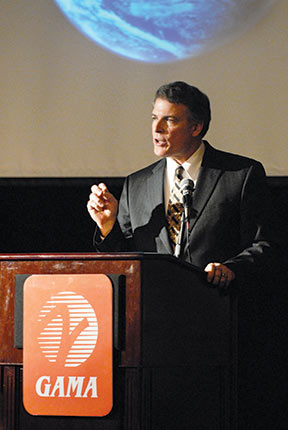 Environmental awareness across the globe is becoming increasingly acute. The global media and the world’s population are increasingly focused on climate change and the extent to which aviation contributes to it. The general aviation manufacturing industry wants to actively participate in this discussion to speed the introduction of innovative technology and flight procedures that will reduce aviation’s impact on the environment. The General Aviation Manufacturers Association (GAMA) is working with its worldwide membership base to build upon a strong track record of improving aircraft efficiency to ensure that the GA manufacturing industry reduces its carbon footprint without compromising the health of the industry or the vitality of the transportation infrastructure.
Environmental awareness across the globe is becoming increasingly acute. The global media and the world’s population are increasingly focused on climate change and the extent to which aviation contributes to it. The general aviation manufacturing industry wants to actively participate in this discussion to speed the introduction of innovative technology and flight procedures that will reduce aviation’s impact on the environment. The General Aviation Manufacturers Association (GAMA) is working with its worldwide membership base to build upon a strong track record of improving aircraft efficiency to ensure that the GA manufacturing industry reduces its carbon footprint without compromising the health of the industry or the vitality of the transportation infrastructure.
Civil aviation has been a leader in addressing environmental issues for decades, and the work has achieved significant results. The United Nation’s Intergovernmental Panel on Climate Change (IPCC) estimates that all of aviation—airlines, cargo carriers and general aviation—accounts for approximately 2% of the world’s CO2 emissions. In the United States, which has the largest GA fleet on the planet, greenhouse gas emissions from GA account for less than a fifth of 1% of overall emissions. The specific fuel consumption of GA turbine engines has improved by more than 50% since they were first introduced in the early 1960s. This means that CO2 emissions from these engines have also declined by the same proportion over the same time period. This remarkable progress was market-driven and achieved without the need for governmental regulations.
This isn’t to say that GA is satisfied with the status quo. Despite aviation’s limited environmental impact and the improvements that the industry has already accomplished, the GA community understands that proactive work is vital to ensuring that we meet the environmental challenges ahead. GAMA supports a balanced approach toward the development of technological, operational and policy options to meet these challenges and reduce aviation’s environmental impact.
For many years, GA manufacturers have diligently worked to reduce fuel burn and achieve lower operating costs, longer range and improved efficiency for their products. These imperatives have only been magnified by the relentless rise in fuel costs. Being environmentally conscious has always made good business sense in general aviation.
By incorporating advanced airframe designs and engine technologies, manufacturers are producing airplanes that reduce fuel burn and emissions. As a result, they’ve made great strides in minimizing the environmental impact of their products.
 GAMA believes that the Next Generation Air Transportation System (NextGen) in the United States and the Single European Sky ATM Research (SESAR) initiative in Europe will deliver significant environmental benefits. For this reason, it’s imperative that the United States move aggressively now to begin the process of executing NextGen.
GAMA believes that the Next Generation Air Transportation System (NextGen) in the United States and the Single European Sky ATM Research (SESAR) initiative in Europe will deliver significant environmental benefits. For this reason, it’s imperative that the United States move aggressively now to begin the process of executing NextGen. The implementation of these modernized air traffic systems incorporates dozens of technologies and capabilities that will eventually lead to reduced congestion, delays and environmental impact. Furthermore, it will lead to increased point-to-point travel between destinations, continuous ascent and descent departures and arrivals, and less noise impact on communities.
GAMA believes that a global approach is necessary to effectively address environmental issues in aviation. We look to the International Civil Aviation Organization (ICAO) to provide the same role for the environment as it does for safety. GAMA is advocating that ICAO develop science-based standards and practices in order to reduce aviation’s environmental impact. ICAO’s leadership will minimize competitive distortions, simplify this process and, most importantly, lead to greater environmental gains.
Through technological innovation, GA manufacturers have significantly improved their environmental performance over the past 50 years. Our industry is looking at every aspect of the aviation experience to see where we can continue to improve our efficiency and limit emissions.
GAMA and its member companies are committed to ensuring that the debate over aviation emissions is informed by facts and sound science, not by emotion and sound bites. Environmental policies should incorporate appropriate cost-benefit calculations and recognize that all aviation, particularly GA, is an integral and essential part of the worldwide transportation system.
Climate change is the greatest environmental issue in the world today and, indeed, many consider it to be the biggest issue of any kind. The aviation industry, in particular GA manufacturers, is committed to ensuring that environmental impacts won’t become the fundamental constraint on industry growth in the 21st century.
Pete Bunce is a command pilot with more than 3,000 hours in fighter and training aircraft. He retired from the U.S. Air Force in 2005 and is now president and CEO of GAMA. To learn more about GAMA, visit www.gama.aero.

